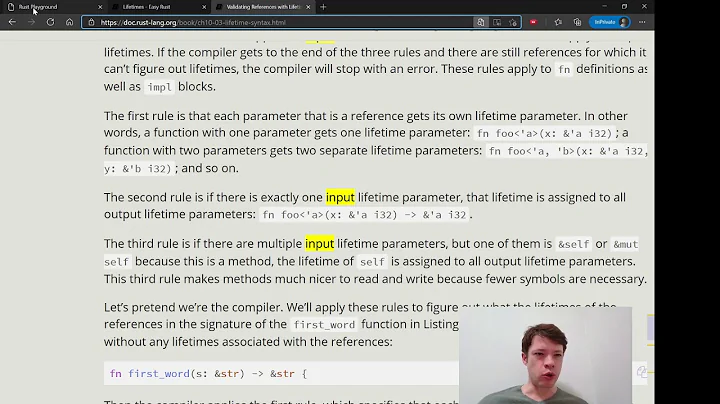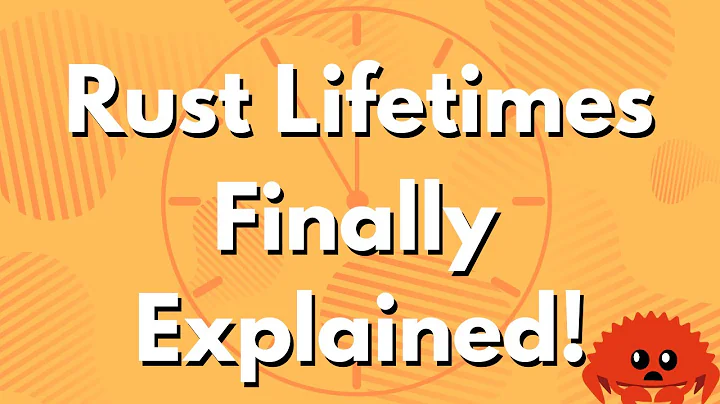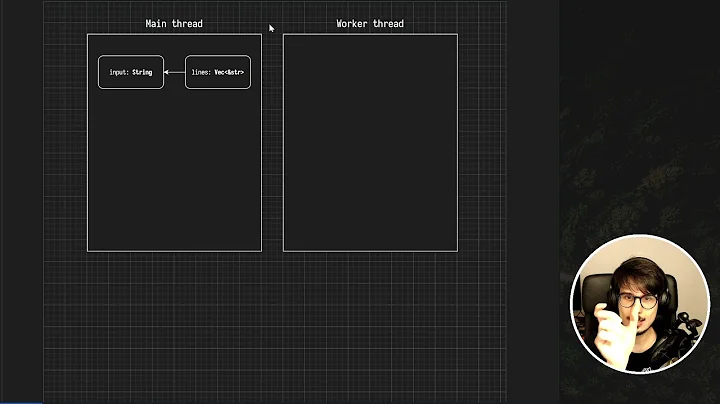What is the correct way to use lifetimes with a struct in Rust?
Solution 1
There is actually more than one reason why the code above fails. Let's break it down a little and explore a few options on how to fix it.
First let's remove the new and try building an instance of A directly in main, so that you see that the first part of the problem has nothing to do with lifetimes:
struct C;
struct B<'b> {
c: &'b C,
}
struct A<'a> {
b: B<'a>,
c: C,
}
fn main() {
// I copied your new directly here
// and renamed c1 so we know what "c"
// the errors refer to
let c1 = C;
let _ = A {
c: c1,
b: B { c: &c1 },
};
}
this fails with:
error[E0382]: use of moved value: `c1`
--> src/main.rs:20:20
|
19 | c: c1,
| -- value moved here
20 | b: B { c: &c1 },
| ^^ value used here after move
|
= note: move occurs because `c1` has type `C`, which does not implement the `Copy` trait
what it says is that if you assign c1 to c, you move its ownership to c (i.e. you can't access it any longer through c1, only through c). This means that all the references to c1 would be no longer valid. But you have a &c1 still in scope (in B), so the compiler can't let you compile this code.
The compiler hints at a possible solution in the error message when it says that type C is non-copyable. If you could make a copy of a C, your code would then be valid, because assigning c1 to c would create a new copy of the value instead of moving ownership of the original copy.
We can make C copyable by changing its definition like this:
#[derive(Copy, Clone)]
struct C;
Now the code above works. Note that what @matthieu-m comments is still true: we can't store both the reference to a value and the value itself in B (we're storing a reference to a value and a COPY of the value here). That's not just for structs, though, it's how ownership works.
Now, if you don't want to (or can't) make C copyable, you can store references in both A and B instead.
struct C;
struct B<'b> {
c: &'b C,
}
struct A<'a> {
b: B<'a>,
c: &'a C, // now this is a reference too
}
fn main() {
let c1 = C;
let _ = A {
c: &c1,
b: B { c: &c1 },
};
}
All good then? Not really... we still want to move the creation of A back into a new method. And THAT's where we will run in trouble with lifetimes. Let's move the creation of A back into a method:
impl<'a> A<'a> {
fn new() -> A<'a> {
let c1 = C;
A {
c: &c1,
b: B { c: &c1 },
}
}
}
as anticipated, here's our lifetime error:
error[E0597]: `c1` does not live long enough
--> src/main.rs:17:17
|
17 | c: &c1,
| ^^ borrowed value does not live long enough
...
20 | }
| - borrowed value only lives until here
|
note: borrowed value must be valid for the lifetime 'a as defined on the impl at 13:1...
--> src/main.rs:13:1
|
13 | impl<'a> A<'a> {
| ^^^^^^^^^^^^^^
error[E0597]: `c1` does not live long enough
--> src/main.rs:18:24
|
18 | b: B { c: &c1 },
| ^^ borrowed value does not live long enough
19 | }
20 | }
| - borrowed value only lives until here
|
note: borrowed value must be valid for the lifetime 'a as defined on the impl at 13:1...
--> src/main.rs:13:1
|
13 | impl<'a> A<'a> {
| ^^^^^^^^^^^^^^
this is because c1 is destroyed at the end of the new method, so we can't return a reference to it.
fn new() -> A<'a> {
let c1 = C; // we create c1 here
A {
c: &c1, // ...take a reference to it
b: B { c: &c1 }, // ...and another
}
} // and destroy c1 here (so we can't return A with a reference to c1)
One possible solution is to create C outside of new and pass it in as a parameter:
struct C;
struct B<'b> {
c: &'b C,
}
struct A<'a> {
b: B<'a>,
c: &'a C
}
fn main() {
let c1 = C;
let _ = A::new(&c1);
}
impl<'a> A<'a> {
fn new(c: &'a C) -> A<'a> {
A {c: c, b: B{c: c}}
}
}
Solution 2
After checking with Manishearth and eddyb on the #rust IRC, I believe it's not possible for a struct to store a reference to itself or a portion of itself. So what you are trying to do isn't possible within Rust's type system.
Related videos on Youtube
uwu
Updated on July 09, 2022Comments
-
 uwu almost 2 years
uwu almost 2 yearsI want to write this structure:
struct A { b: B, c: C, } struct B { c: &C, } struct C;The
B.cshould be borrowed fromA.c.A -> b: B -> c: &C -- borrow from --+ | c: C <------------------+This is what I tried: struct C;
struct B<'b> { c: &'b C, } struct A<'a> { b: B<'a>, c: C, } impl<'a> A<'a> { fn new<'b>() -> A<'b> { let c = C; A { c: c, b: B { c: &c }, } } } fn main() {}But it fails:
error[E0597]: `c` does not live long enough --> src/main.rs:17:24 | 17 | b: B { c: &c }, | ^ borrowed value does not live long enough 18 | } 19 | } | - borrowed value only lives until here | note: borrowed value must be valid for the lifetime 'b as defined on the method body at 13:5... --> src/main.rs:13:5 | 13 | fn new<'b>() -> A<'b> { | ^^^^^^^^^^^^^^^^^^^^^ error[E0382]: use of moved value: `c` --> src/main.rs:17:24 | 16 | c: c, | - value moved here 17 | b: B { c: &c }, | ^ value used here after move | = note: move occurs because `c` has type `C`, which does not implement the `Copy` traitI've read the Rust documentation on ownership, but I still don't know how to fix it.
-
 Matthieu M. over 9 yearsSibling references (ie, referencing part of the same struct) is not possible in Rust.
Matthieu M. over 9 yearsSibling references (ie, referencing part of the same struct) is not possible in Rust.
-
-
Sushisource about 6 yearsDo you (or anyone else) know if there's a way to make the compiler happy while still creating "C" inside of the new fn?
-
Paolo Falabella about 6 years@Sushisource technically you could return references with a static lifetime (
&'static C), but that's rarely useful in practice -
nybon over 4 yearsHi Rufflewind, do you know what the alternative is if storing a reference to a portion of struct itself is not possible?
-
zbrojny120 over 4 yearsDoes anyone know if now it would somehow be possible to do something about this using
Pins? The example in the docs shows how to achieve something similar by replacing&'a Twith*const T. However, I don't see any way to somehow replaceB<'a>with a raw pointer. Is there any? -
GrandOpener over 3 years@nybon The most typical solution would be one of either referring to the value directly (i.e.
self.b.cin the above example, withself.comitted entirely), or if that is undesirable, providing a method that generates references to C on demand (and those references can correctly be annotated with the struct's lifetime). -
YvesQuemener about 3 yearsIn a similar situation I ended up using
Arc<>for this case, which is a bit overkill IMO, but I did not see a more crustacean way of doing yet. -
towry about 3 yearsAllocate the struct C on heap instead of stack and use RC.







